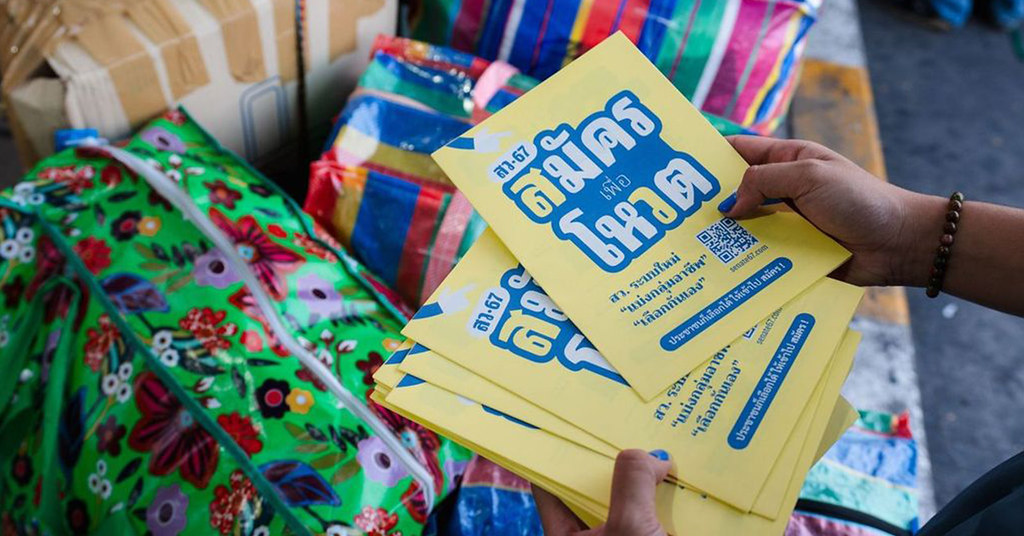The Election Commission of Thailand (ECT)’s regulations preventing senate candidates from publicly introducing themselves has led to lawsuits and concerns that it would limit public participation in the election.

A pamphlet explaining the Senate election process handed out by activists from iLaw and ConForAll at a campaign event on 12 April. (File photo)
The regulations were published in the Royal Gazette on 26 April and state that senate candidates are allowed to print their profile and photo on up to 2 pages of A4 paper, which may contain only personal information and work experience. They may disseminate the document online, but only to other candidates, and are not allowed to distribute the document in public.
Candidates are not allowed to introduce themselves on television, radio, or in publications. They are also not allowed to give media interviews and are prohibited from mentioning the monarchy or using “speech that is violent or incite disorder” in their introduction.
Candidates who work in broadcasting, journalism, advertising, or are performers are not allowed to use their professional skills in their campaigns. Candidates may not assist each other in their campaigns, and must not allow executive board members of political parties, members of parliament, members of local councils, local administrators, or anyone holding a political office or a position in a political party to assist their campaign.
The ECT also claimed that candidates who put information about themselves onto websites or social media may be violating the regulation.
After the regulations were published, the legal watchdog NGO iLaw took down the candidate profiles on its senate67.com website. iLaw and its partner organizations have been running a campaign calling for people to run for the Senate and initially opened the website to raise awareness about the election process and encouraging people to declare their intention to run.
iLaw issued a statement on 27 April saying that, by allowing candidates to introduce themselves only to each other, the ECT is cutting the public out of the Senate election. The regulations are also unclear and create a climate in which candidates are afraid of introducing themselves because they are not sure of what they are allowed to do. Members of the press have also contacted iLaw asking whether they have to take down interviews they had already published of potential candidates, but the ECT has never cleared up these questions. This means that the media are unsure about reporting on the Senate election, depriving the public of access to information and their chance at participation.
Limitations to candidate introductions would force candidates to seek out other candidates in their district and profession to introduce themselves. They would be prohibited from declaring their political stance and may not find other candidates through online media. This forces candidates to hold their own gatherings outside of the public eye, which could make it easy for deals to be made or bribes exchanged. It could also mean that anyone with influence or a network has an advantage over experts who may be publicly known, and the public would be prevented from participating in the process since they would not know who is running for the Senate.
Meanwhile, several potential candidates have filed administrative lawsuits for the regulations to be revoked. On 30 April, former Dean of Thammasat University’s Faculty of Law Panat Tasneeyanond, Dr Pairoj Boonsirikamchai, television host Chonlanat Klinsuwan, and singer Sirasak Ittipholpanich filed a lawsuit with the Administrative Court asking for the regulations to be revoked as an excessive infringement of the right to freedom of expression, as a contravention of the intention for the Senate to represent the people, and as creating an excessive burden for candidates.
Prachatai editor-in-chief Tewarit Maneechai, who has announced his intention to run for the Senate, also filed a lawsuit with the Administrative Court on 28 April calling for the regulations to be revoked because it prevents public participation and infringes on candidates’ freedom to work, particularly for those in journalism and the arts.
The election observation network We Watch issued an open letter on 2 May criticizing the regulations for being so strict that they create a climate of fear and anxiety for potential candidates, noting that violating the ECT’s regulations carries a prison sentence of up to 1 year, a fine of up to 20,000 baht, or both. Anyone found in violation of the regulations may also be banned from running in an election for 5 years.
Meanwhile, prohibiting candidates from introducing themselves on public social media prevents public participation, which is unconstitutional since the Constitution requires the government to promote public participation in development, political decision-making, combating corruption and misconduct, and acting as a check and balance against the government. Such a regulation could not only reduce public approval of the new Senate but also damage public trust in the ECT.
The regulation also obstructs press freedom because it does not give a clear definition of what counts as an introduction. Journalists reporting on the Senate election may choose to self-censor for safety, since they may also face penalties if their reporting is seen as assisting a candidate.
We Watch called on the ECT to suspend and amend the regulations to make the election free and fair, as well as ensure public participation. The ECT should also set up a procedure to promote public awareness and participation, as well as public inquiry into corruption, and must be open to the opinion of affected citizens and journalists.
Prachatai English is an independent, non-profit news outlet committed to covering underreported issues in Thailand, especially about democratization and human rights, despite pressure from the authorities. Your support will ensure that we stay a professional media source and be able to meet the challenges and deliver in-depth reporting.
• Simple steps to support Prachatai English
1. Bank transfer to account “โครงการหนังสือพิมพ์อินเทอร์เน็ต ประชาไท” or “Prachatai Online Newspaper” 091-0-21689-4, Krungthai Bank
2. Or, Transfer money via Paypal, to e-mail address: [email protected], please leave a comment on the transaction as “For Prachatai English”
